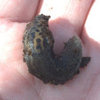Natural Tick Control Is it Possible?
IpmMan
12 years ago
Related Stories

LANDSCAPE DESIGNClimate Control: Work With Nature's Elements for the Best Outdoor Space
Consider sun, wind and water where you live for a deck or patio that's as comfortable as possible all year long
Full Story
HOME TECHSwitch On the Phone-Controlled Home
Lock your front door from afar, let your thermostat set itself and more when you use your phone as a control device
Full Story
BATHROOM DESIGNHow to Place Shower Controls for Bathing Bliss
Body jets, handhelds and showerheads are only as good as their placement. Here's how to get it right
Full Story
ARCHITECTUREModern Homes That Control the Sun
See architecture that creates shade and manages temperatures — and offers some much-needed visual escapism
Full Story
INSPIRING GARDENSLawn Gives Way to a More Natural Lakeside Garden
Meadow grasses, beach pebbles and driftwood replace turfgrass in a nature-friendly landscape on Lake Washington’s shore
Full Story
REMODELING GUIDESModern Metal Fireplaces Open World of Possibilities
Allowing way more natural light than traditional fireplaces, and with some not even needing a vent, metal fireplaces are a major improvement
Full Story
ARCHITECTUREAll the Possibilities: 4 Homes at the Edge of the Earth
Travel to the far reaches of land, where these residences straddle rocky cliffs, leafy lakeshores and choppy inlets
Full Story
HEALTHY HOMEGive Your Baby the Healthiest, Safest Nursery Possible
Protect your newborn by choosing nontoxic nursery furniture, bedding, rugs and paint. We give you all the details here
Full Story
BATHROOM DESIGNDoorless Showers Open a World of Possibilities
Universal design and an open bathroom feel are just two benefits. Here’s how to make the most of these design darlings
Full Story
FEEL-GOOD HOMEDesigning for Pleasure: Savor Your Natural Surroundings
Homes that allow us to experience the land, light, wind and water put us in touch with our primitive comforts
Full StoryMore Discussions









Kimmsr
IpmManOriginal Author
Related Professionals
Maple Valley Landscape Architects & Landscape Designers · River Forest Landscape Architects & Landscape Designers · Simi Valley Landscape Architects & Landscape Designers · Westwood Landscape Contractors · East Chicago Landscape Contractors · Federal Way Landscape Contractors · Framingham Landscape Contractors · Hampton Bays Landscape Contractors · Leicester Landscape Contractors · Mastic Beach Landscape Contractors · Pleasant Grove Landscape Contractors · Four Corners Landscape Contractors · Goldenrod Landscape Contractors · Crowley Landscape Contractors · Merrifield Landscape Contractorstsugajunkie z5 SE WI ♱
zen_man
IpmManOriginal Author
alisande
BillM2
pbatech